

Human Evolution Timeline. Where and When Did Humans Evolve? Should we redesign humans? 550 million years of human evolution [animation] Becoming Human. Evolution The Evolution of humans documentary 2015 HD. Natural Selection: How Evolution Works. December 2004 What is natural selection, and how is it central to the theory of evolution?
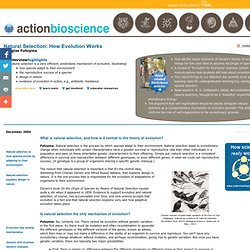
Natural selection is how species evolve by adapting to their environment. Natural selection explains design in nature. Charles Darwin studied beak variation of finches on the Galapagos Islands as evidence of natural selection. Illustration from BSCS, Biological Science: Molecules to Man, 1963. Futuyma: Natural selection is the process by which species adapt to their environment. The reason that natural selection is important is that it’s the central idea, stemming from Charles Darwin and Alfred Russel Wallace, that explains design in nature. Darwin’s book On the Origin of Species by Means of Natural Selection caused quite a stir when it appeared in 1859. Is natural selection the only mechanism of evolution? Evolution has several mechanisms. Genetic drift involves random changes. Futuyma: No, certainly not. Natural selection is more consistent, adaptive change. Futuyma: It sometimes does but not always. What is Evolution - history and definitions.
Evolution is a scientific theory that essentially states species change over time.
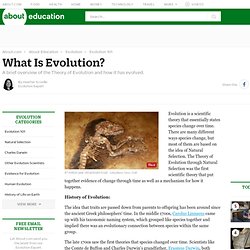
There are many different ways species change, but most of them are based on the idea of Natural Selection. The Theory of Evolution through Natural Selection was the first scientific theory that put together evidence of change through time as well as a mechanism for how it happens. History of Evolution: The idea that traits are passed down from parents to offspring has been around since the ancient Greek philosophers' time. In the middle 1700s, Carolus Linnaeus came up with his taxonomic naming system, which grouped like species together and implied there was an evolutionary connection between species within the same group. The late 1700s saw the first theories that species changed over time. John Baptiste Lamarck, a student of the Comte de Buffon, was the first to publicly state species changed over time. Darwin and Natural Selection: Darwin was not the only person to come up with this idea at that time. Facts Of Evolution Chapter 4.
(A few) transitional fossils. Is this the ancestor of all primates? - life - 05 June 2013. (Image: Paul Tafforeau (ESRF) and Xijun Ni (Chinese Academy of Sciences)) Could this tiny animal, with a body just seven centimetres long, be the ancestor of all living primates – including humans?
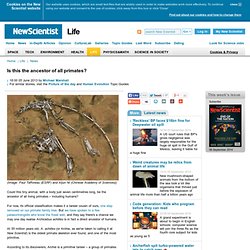
For now, its official classification makes it a tarsier cousin of ours, one step removed on our primate family tree. But we have spoken to a few palaeontologists who know the fossil well, and they say there's a chance we may one day realise Archicebus achilles is in fact a direct ancestor of humans. At 55 million years old, A. achilles (or Archie, as we've taken to calling it at New Scientist) is the oldest primate skeleton ever found, and one of the most primitive.
According to its discoverers, Archie is a primitive tarsier – a group of primates closely related to monkeys, apes and humans. That may not be the end of the story, though. Discover Archie's full story, including how it evolved and its relationship to us, in "Our earliest primate cousin discovered in Asia". More From New Scientist. Lao skull earliest example of modern human fossil in Southeast Asia. An ancient skull recovered from a cave in the Annamite Mountains in northern Laos is the oldest modern human fossil found in Southeast Asia, researchers report.
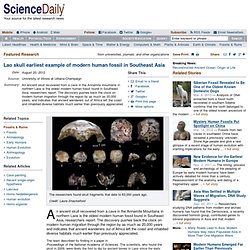
The discovery pushes back the clock on modern human migration through the region by as much as 20,000 years and indicates that ancient wanderers out of Africa left the coast and inhabited diverse habitats much earlier than previously appreciated. New evidence for the earliest modern humans in Europe. The timing, process and archaeology of the peopling of Europe by early modern humans have been actively debated for more than a century.
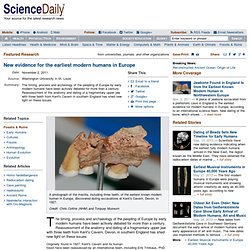
Reassessment of the anatomy and dating of a fragmentary upper jaw with three teeth from Kent's Cavern, Devon, in southern England has shed new light on these issues. Originally found in 1927, Kent's Cavern and its human fossil have been reassessed by an international team, including Erik Trinkaus, PhD, professor of anthropology in Arts & Sciences at Washington University in St. Louis, and the results published in Nature. The Kent's Cavern human joins the human skull and lower jaw from the Peştera cu Oase, Romania, in establishing the presence of modern humans at both ends of Europe (northwest and southeast) by at least 40,000 years ago.
"Modern humans were previously known to be this old in southeastern Europe, but they had not been documented as early in western Europe until the reassessment of the Kent's Cavern fossil," Trinkaus says. Darwin's Natural Selection Still at Work in Humans. The evolutionary process that Charles Darwin discovered almost 150 years ago, responsible for transforming dinosaurs into birds and allowing the walking ancestors of whales to take to the seas, is still quietly at work in humans today.
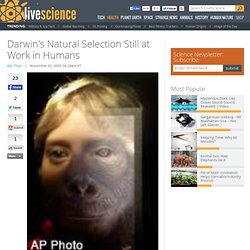
Darwin's natural selection is the process by which nature rewards those individuals better adapted to their environments with survival and reproductive success. It works at the level of genes, sections of DNA that encode for proteins serve as the software of life. In one of the most detailed human DNA studies ever conducted, researchers analyzed nearly 12,000 genes from 39 people and a chimpanzee, our closest living relative. The findings suggest that about 9 percent of the human genes examined are undergoing rapid evolution. "Our study suggests that natural selection has played an important role in patterning the human genome," said Carlos Bustamante, a biologist at Cornell University.
Compared to chimps ...